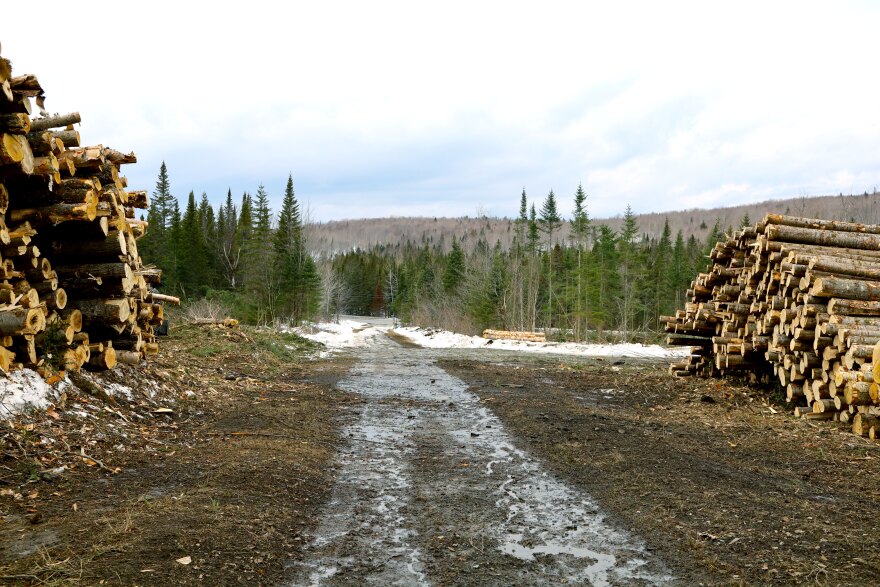Municipalities along the Maine coast, such as Portland, York and Stonington, have been preparing for years to adapt to the effects of climate change. They've been planning for sea level rise and floods, and adapting infrastructure to handle more extreme weather.
But for many rural communities inland, budgets rarely pay for planning staff or expertise. Earlier this year, the state launched its own effort to assist on that front. And in Somerset County, the Kennebec Valley Council of Governments has added staff in recent years to try to jumpstart some of that work.
All Things Considered host Robbie Feinberg spoke with the group's interim executive director, Joel Greenwood, about the threats posed to towns in rural Maine.
This interview is part of our series "Climate Driven: A deep dive into Maine's response, one county at a time." It has been edited for clarity.
Greenwood: Rural communities have a lot of different challenges, usually related to, you know, the increase in the number and severity of storm events, for example, in terms of the damage that can do to communities, local infrastructure and the economic effects that that can have. So there's a lot of different challenges that you have to try and identify and communicate to towns, but also a lot of our region, apart from the major service centers, very small rural communities, don't have the budget and the resources to really start to think about this, and, you know, kind of plan for the future.
Feinberg: Yeah. So you talking about those small rural communities, I'm sure that that comes with very, very limited staffing for this work. Do you think that is the biggest challenge that you face when it comes to planning for resilience and climate?
I think so. I think the No. 1 challenge at the moment is capacity. We've been lucky to have, for the past two years, two resiliency coordinator positions with limited funding for two years, ran from 2020 up till the end of June 2022. And they've been able to get out to the communities and begin these discussions and try and communicate ideas in a way that resonate with people, especially people in smaller communities that might not directly understand that these impacts would be having a particular impact on the way that they live.
How do you communicate with some of these towns? Are you saying 'climate change and its effects,' or using different terms? How do you approach this in some of these small places?
It's a challenge sometimes to get some traction when you're going out there and talking about that. So one way, you could go out and try and talk about climate change. But one way we found that is usually a bit more effective is to go out and talk about things that municipalities are already, you know, well versed in. So we talk about, for example, their road budget, and the way that culverts are installed in town. One of the issues if you're going to have intense and frequent flood events, then you've got to have the infrastructure to be able to deal with those are stormwater systems, culverts in rural roads that won't get washed out so that they're sized properly. So if you approach this from the bottom upwards, as opposed to trying to impose kind of a climate change conversation from the top, we usually find that you get a little more traction, even if without, like you're saying, without using the word specifically 'climate change.'

So in general, what's the response been, especially this work over the past year and a half that you talk about with these resiliency coordinators? Are there specific efforts that have already come out of this work that you've seen?
Well, we've started getting out there, we've started having these discussions, we've managed to identify certain communities that, you know, seem to be responsive, and as such are kind of moving into the next phase of trying to receive some money for this in terms of identifying communities that do want to take this forward. In terms of engaging in some specific planning we did, we were successful in receiving a grant from the state, from the Governor's Office of Policy Innovation and the Future to work on what's called the service provider grant for the community resilience partnership. So we've identified five of our communities specifically that have agreed to begin to work on this at the planning stage, with the ultimate aim of identifying more funding to bring in and actually do some direct resiliency projects.
At the same time, I'm just wondering about the sustainability of these efforts. You mentioned the fact that these resiliency coordinator positions, they're up in only a few months. So where does that put you? Is that going to set you back at all?
We are waiting on a couple of grants to see if we get those back. But I mean, one of the things that would be nice, generally, which I'm sure, like anyone, is just having more guaranteed, sustained funding going forward, rather than having to try and, you know, apply for pots of money here and there as we go, you know, like a year or two at a time. It does kind of make it difficult if you start to make progress and then you have to divert resources into finding more funding to keep the work going and hopefully not have any setbacks because of that.




